How did Obama and Cameron fall out?
- Published
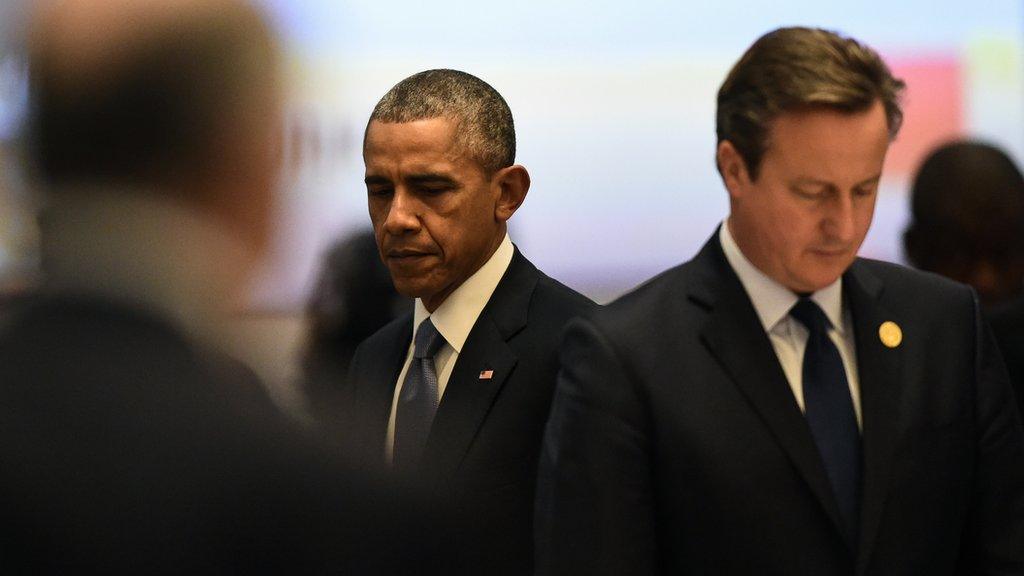
Seeing things differently - President Obama expressed frustrations with British foreign policy
Barack Obama has revealed his frustration with aspects of Britain's foreign policy under David Cameron. What does it mean for US-UK relations?
Last week was the 70th anniversary of the speech in which Winston Churchill coined the phrase "special relationship" (an oration at Westminster College in Fulton, Missouri, which, incidentally, also lodged "iron curtain" in the diplomatic lexicon). In the intervening decades, Downing Street has obsessed about its status. These are the most sacred words in British diplomacy. Maintaining an intimate friendship with Washington has been the bedrock of post-war British foreign policy.
So the special relationship antennae, those delicately calibrated instruments tuned to pick up even the slightest of ructions, would have been swaying violently from side to side following Barack Obama's criticism of David Cameron.
In an interview with The Atlantic, external - oh, the irony of that masthead - the US president lamented the chaotic state of Libya, and laid part of the blame at the door of European leaders. Cameron had been "distracted by a range of other things," the president told Jeffrey Goldberg, a journalist with an almost psychiatric skill at extracting Obama's inner most thoughts. Obama said he had "more faith in the Europeans."
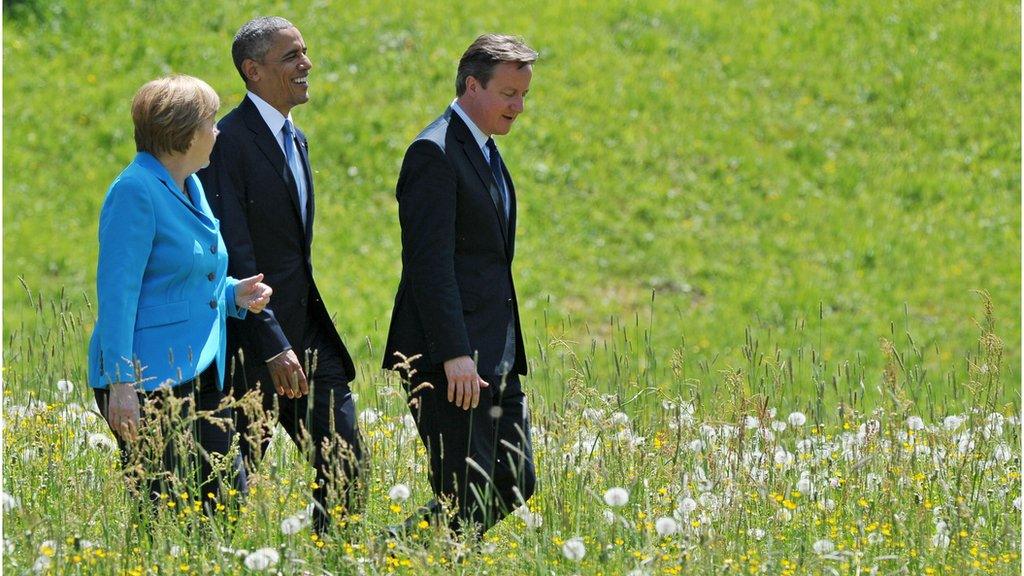
Leading from behind - Mr Obama values his partnership with the German Chancellor
During the interview, the president expressed frustrations with "free riders" in the international community who failed to make their military resources available at times of crisis, and the article seemed to suggest that Britain was in danger of falling into that camp. At last year's G7 summit in Bavaria, the president apparently told Cameron "you have to pay your fair share" on defence spending if the special relationship between the US and the UK was to remain intact.
Cameron 'distracted by other things'
Judging by their awkward body language when they appeared together for a photo-opportunity, it seemed clear that harsh words had been exchanged beforehand. Shortly afterwards, Downing Street also announced that the UK would meet a Nato commitment to spend 2% of GDP on defence.
Mindful of the diplomatic sensibilities involved and how the story would play in Britain, the White House actually reached out to the BBC about The Atlantic article before we put in the usual calls. A few journalists in our Washington newsroom received, unsolicited, an email from Ned Price, a spokesperson for the National Security Council.
"Prime Minister David Cameron has been as close a partner as the president has had. We deeply value the UK's contributions on our shared national security and foreign policy objectives which reflect our special and essential relationship," he assured us. "With respect to Libya, the President has long said that all of us - including the United States - could have done more in the aftermath of the Libyan intervention."
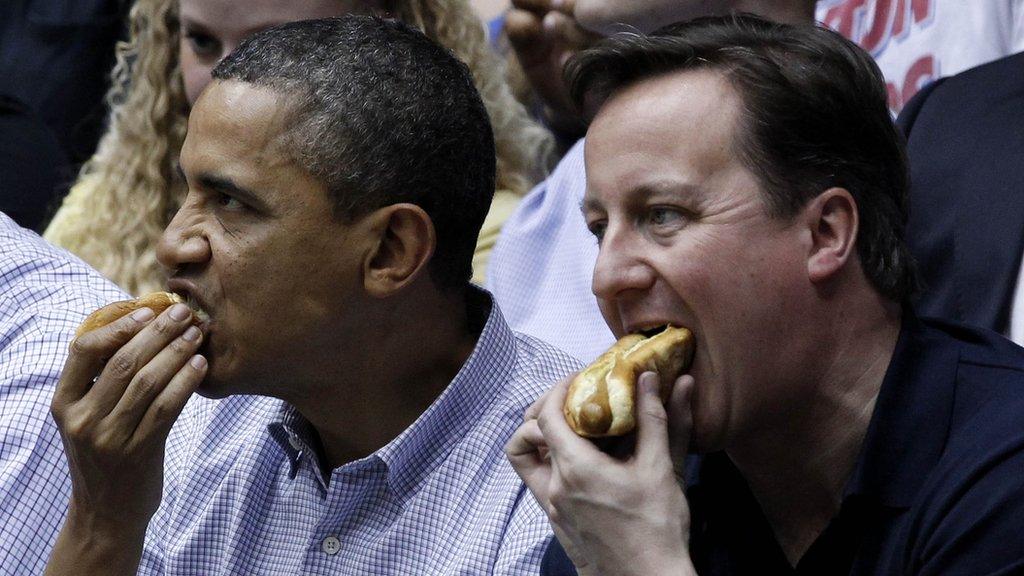
In happier times - the president and prime minister at a basketball game in the US
Then came more diplomatic damage control. "More broadly, the UK has stepped up on a range of issues, including PM Cameron's leadership within NATO in terms of meeting the 2 percent commitment." What the White House was essentially saying was that there were stress points in the special relationship but these have been addressed.
The problem, however, for Downing Street is that the Obama administration's gripes with Downing Street don't end with Libya and defence spending. In recent years, the White House has been aggrieved by the Cameron government's Asian pivot towards China. For the Americans it smacks of Britain hedging its bets over which country will end this century the dominant global power.
Britain's decision last year to join Beijing's new Asian Infrastructure Investment Bank, which was set up to rival the World Bank headquartered in Washington, put the relationship under serious strain. As a US official told the Financial Times: "We are wary about a trend toward constant accommodation of China, which is not the best way to engage a rising power." As with the interview in The Atlantic, that would have put the special relationship monitoring devices almost into meltdown.
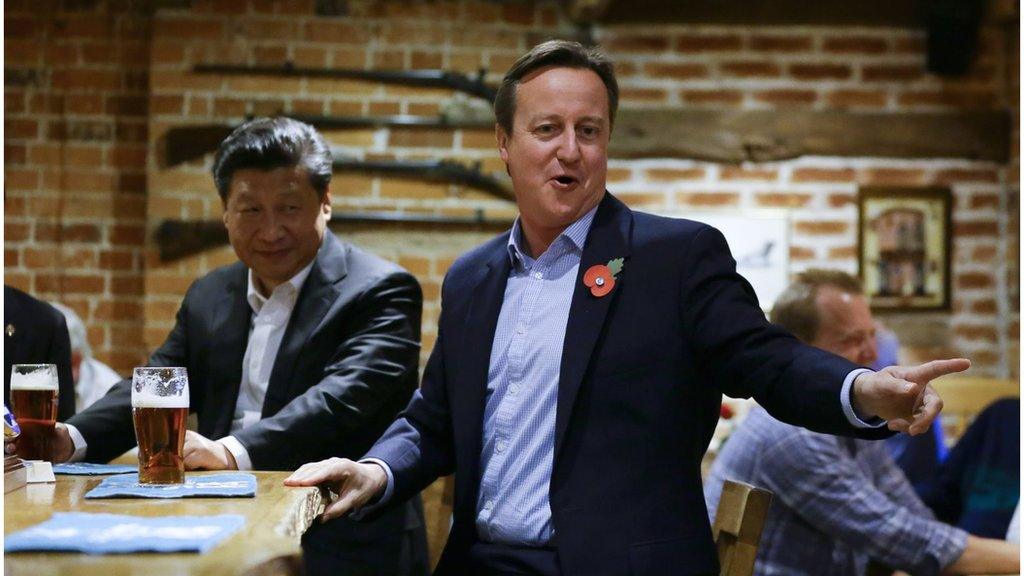
A burgeoning friendship - David Cameron with Chinese President Xi Jinping
I've also been told that the Obama administration has grown frustrated that its requests for operational assistance from British special forces, including the famed SAS, are not granted with the same frequency that they were in the past. Again, it's that criticism that the UK is no longer punching its weight. Or, to use an analytical line that has taken hold in America over the past two years, that "Britain has essentially resigned as a global power," to quote the foreign affairs commentator Fareed Zakaria.
What's also clear is that Barack Obama regards the German Chancellor Angela Merkel, rather than David Cameron, as the most commanding political figure in Europe. Administration officials make no secret of that. And clearly, there's not the mind meld between Cameron and Obama that George W. Bush had with Tony Blair or that Margaret Thatcher enjoyed with Ronald Reagan.
Besides, Obama, who grew up in Hawaii and Indonesia, is more of a Pacific president than an Atlantic president. Indeed, the world leader with whom he enjoyed the closest relationship when first he came to power was the then Australian prime minister, Kevin Rudd. The US ambassador in Canberra at the time used the phrase "perfect relationship".
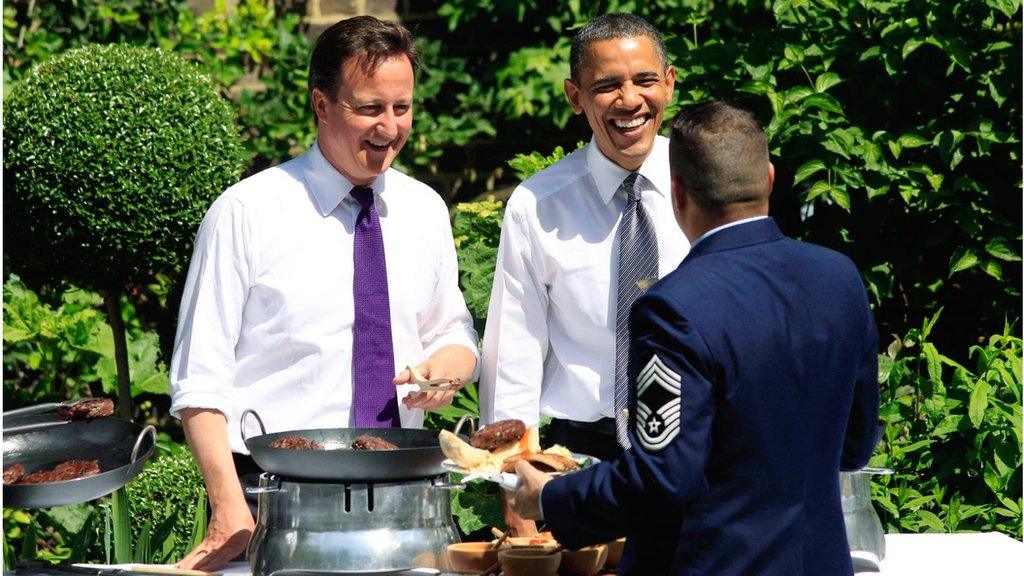
Serving up sausages - and a unified message on foreign policy - back in 2011
David Cameron has always prided himself on the joviality of his personal relationship with Barack Obama, and trips have been intricately choreographed to highlight that they're pals. They ate hot dogs together watching basketball in Ohio four years ago, and were barbecue buddies in the Downing Street garden during a presidential visit in May 2011.
The images from that day, showing both wielding barbie utensils, are interesting to ponder in the light of The Atlantic interview. After all, it's rare for a US president to even gently kebab a British prime minister.